
and the wretched people have only known peace and
plenty when bowing the head willingly to the yoke
and putting aside all resistance. Probably the people
have in them still much of the old warlike spirit only
waiting to be roused by some powerful incentive, and
the assurance that while fighting, their homes will not
be plundered and broken up. Wherever our Kashmiri
auxiliaries of the Imperial Service troops have been
employed they have behaved well and shown plenty of
pluck, so that it may be that their old story is true, mid
that the invaders forced on them the “ pheran or
womanly “ frock,” which is the universal wear in
Kashmir, in order to break their spirit, and that once
freed from that, they regain their old powers and forget
their softness and effeminacy.
From the narrow, dark ways of the city we emerged
into the Dal Lake. A strange network of waterways
hedged about with osiers, and small trees, requiring a
very accurate knowledge to prevent hopeless straying,
for the floating gardens, about which more anon, have
so filled up the lake that only in one part is there still
open water, all the rest is cut up with countless tracks
like miniature canals separated one from another by the
high green crops or reeds and trees. Ponies and cattle
feed among them; men, women, and children wade
about or work at them from their shallow, flat-bottomed
boats, and the place gives more the idea of being the
home of a naturally amphibious race than any scene
amid the waterways of Holland or the lagoons.
They have not yet accomplished all that is necessary
for the complete comfort of such an existence, as was
proved by the untimely upset of an aged crony who,
steering her boat full of fodder gathered from the water,
ran into us in spite of warning cries, was precipitated
from her insecure perch in front of her boat, shrieking
aloud as we hooked her out. She could not at all see
the joke, though my men laughed hugely as they
assisted her to wring out her wispy garments and set
her anew in her place. Again, as we were caught in a
block, I spoke to a woman holding her baby. “Why
not put it in the water?” I said. “ I t would be
drowned,” she screamed indignantly. I suppose
common sense might have told me that, but really it only
appeared natural that it should spread out little web
feet and hands and take easily to what seemed, as if
it must be, its natural element.
The last signs of the storm, in the form of
heavy clouds, were floating away to the eastward
over the crest of the Takht-i-Suleiman, and the
sun was setting in a glory of gold and crimson
and amethyst as we passed into the open. Fortress-
crowned hills to the westward of the town stood out
against the gorgeous background, fragments of cloudlets
caught up the glow and showed a glittering lining to
their dark purples and crimsons as they hurried in to
join the coucher du roi, great monarch of light, and
therefore life. Slowly we made our way through the
great Dal Darwaza, the gates of the lake that prevent its
being flooded when the river is high, and passing by
various canals reached the Moonshi Bagh, the favourite
moorings and camping-ground for married folk and
ladies, the menkind, with their usual eye to beauty and
comfort, having taken possession of the lovely Chenaar
Bagh, the other good camping-ground. The Moonshi
Bagh is on the main stream, and there is not much to
complain of there when not too crowded. There is